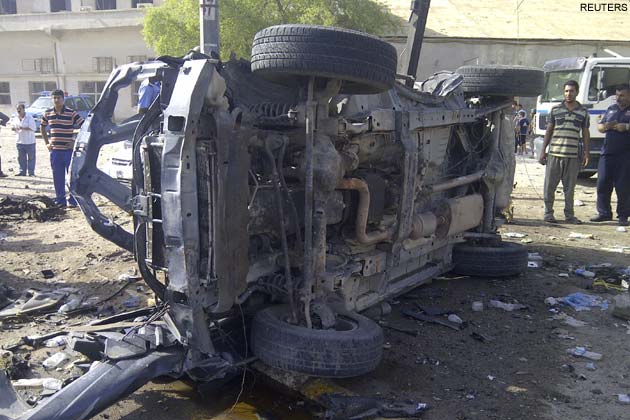
Baghdad, June 13: Coordinated car bombs in four Iraqi cities targeting Shiite pilgrims killed at least 56 people and wounded dozens more early on Wednesday in Iraq's latest wave of sectarian-fuelled violence, officials said.
The death toll was expected to rise in the attacks, which included car bombs that tore into Shiite religious processions at four different locations across Baghdad. It was the third attack in the capital this week targeting the annual pilgrimage commemorating the 8th century death of a revered imam.
Two police officers said the first bomb struck pilgrims in a procession at around 5 a.m. in the northern Baghdad neighbourhood of Taji, killing seven and wounding 22 people.
Within hours, three more explosions hit other processions in different parts of the Iraqi capital, killing at least 19 more people and wounding more than 50, police officers said. All officials spoke on condition of anonymity because they were not authorized to talk to the media.
In the city of Hillah, 95 kilometers (60 miles) south of Baghdad, two car bombs exploded minutes apart at dawn in the center of town, killing 21 people and wounding 53, according to two police officers and one health worker.
Nearby, in the southern city of Karbala, a parked car exploded at about 8 a.m. near another group of Shiite pilgrims, killing two people and injuring 22 others, a police official and health official said. Karbala is 55 miles (90 kilometers) south of Baghdad.
And north of Baghdad, in the Shiite town of Balad, two simultaneously car bombs killed seven pilgrims and injured 34 others, a police official and health official said. Balad is 50 miles (80 kilometers) north of the capital, near the city of Tikrit.
The bombs went off as the pilgrims started to make their way to Baghdad for the commemorations marking the death of al-Kadhim, one of the 12 principal Shiite saints, who is said to be buried in a shrine there. The attacks were launched against the backdrop of a prolonged sectarian-based political crisis that some fear is opening the door to renewed violence.
Last year's pilgrimage to the al-Kadhim shrine passed without incident, and Iraqi security officials at the time hailed their troops' work as a huge success.
However, Shiite pilgrims have been frequent targets of attack by Sunni insurgents, some with links to al-Qaida. Iraq's bloodiest wave of sectarian fighting was triggered by a bomb blast in February 2006 that ravaged a Shiite shrine in the city of Samarra.
Prime Minister Nouri al-Maliki, a Shiite, has been accused of amassing power and cutting coalition partners, mainly minority Sunnis and Kurds, out of decision making. Disgruntled coalition politicians have been trying to unseat al-Maliki with a vote of no confidence in parliament, but so far have been unable to muster the necessary backing.




Comments
Add new comment